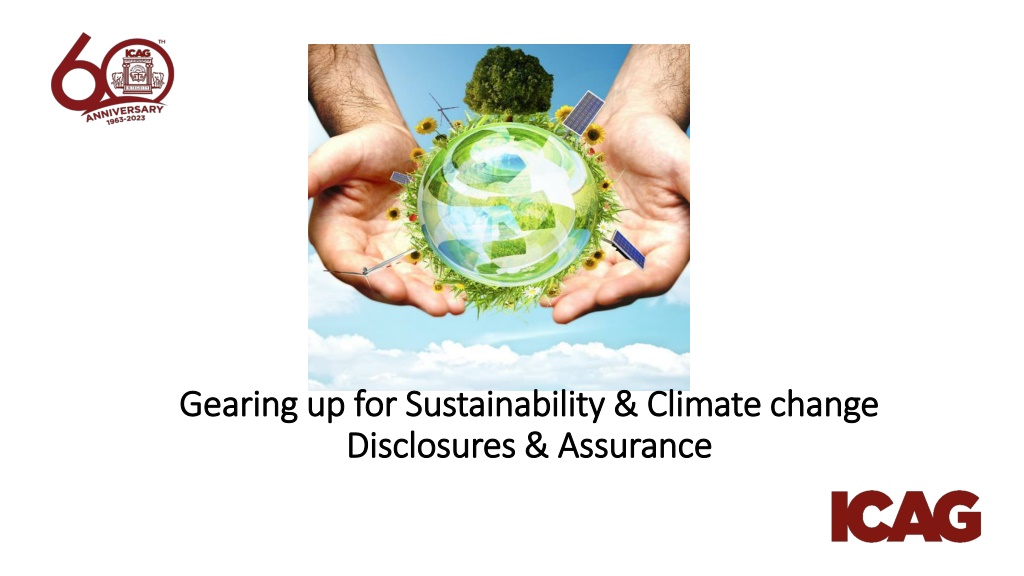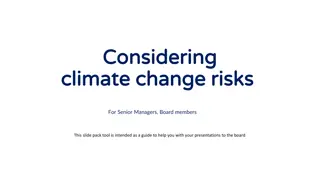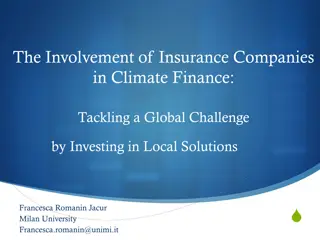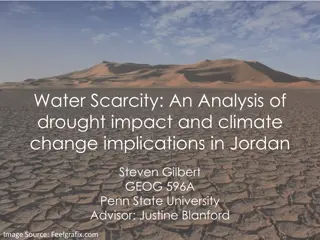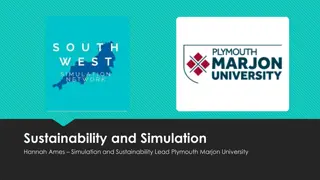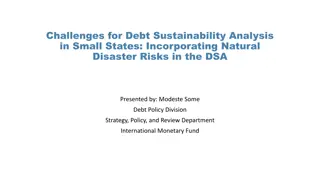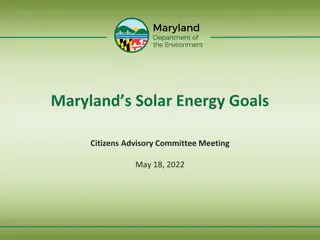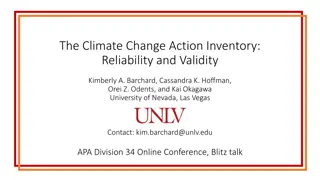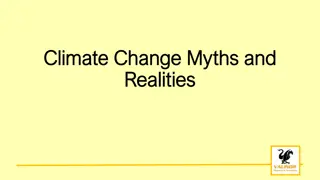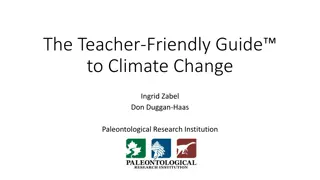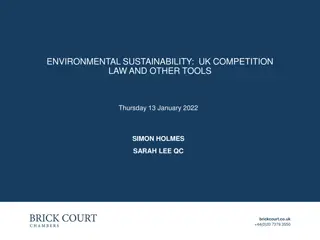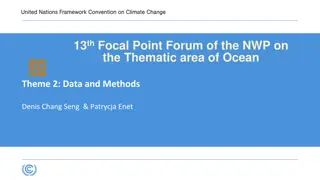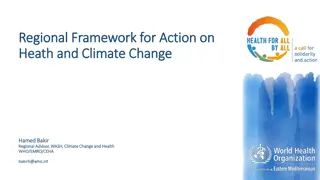Exploring Sustainability and Addressing Climate Change Challenges
Delve into the realms of sustainability and climate change, focusing on business cases, key concepts, international standards, and the urgency of mitigation and adaptation strategies. Uncover the impact of human activities on climate change, the essence of ESG factors, and proposed solutions like the circular economy. Witness the call to action for net-zero emissions by 2050 and the critical need for global cooperation to combat climate risks.
Download Presentation

Please find below an Image/Link to download the presentation.
The content on the website is provided AS IS for your information and personal use only. It may not be sold, licensed, or shared on other websites without obtaining consent from the author. Download presentation by click this link. If you encounter any issues during the download, it is possible that the publisher has removed the file from their server.
E N D
Presentation Transcript
Gearing up for Sustainability & Climate change Gearing up for Sustainability & Climate change Disclosures & Assurance Disclosures & Assurance
Outline The Business case for SMPs (and SMEs) Key sustainability Concepts The business case for sustainability for SMPs & SMEs The New Standards Snapshot of New International sustainability standards and disclosure requirements Overview of relevant ISAs Meeting the challenge Q and A
Sustainability & Climate Change - Living in the New Normal
The sustainability Conversation SDGs Nature underpins every person s wellbeing and ambitions from health and happiness to prosperity and security -Sir Robert Watson
Defining.. Defining .. SUSTAINABILITY CLIMATE CHANGE Long Long- -term shifts in temperatures & term shifts in temperatures & weather patterns weather patterns Meeting the needs of the present Meeting the needs of the present without compromising the ability without compromising the ability of future generations to meet their of future generations to meet their own needs. own needs. World Commission for Environment and Development (WCED), 1987 human activities - main driver of climate change since the 1800s. Source: primarily greenhouse gas emissions (GHG) including CO2, CH4, N2O & fluorinated gases. - www.un.org/en/climatechange/what-is-climate-change ESG- Environmental, Social & (corporate) Governance -alternative way to describe matters related to sustainability
Addressing Climate Change 1. Climate change mitigation Goal- net-zero carbon emissions by 2050 AND reduce other GHG emissions by 35% or more by 2050 compared to 2010 2. Climate change adaptation Carbon offsetting, Coping with rising sea levels, severe weather events etc. Issues/Challenges Climate risk = transverse risk requires significant financial investments missing $100 billion annually to developing countries (pledge made 14 years ago!) The world is not on target to curb global warming, (U.N. Sept. 2023)
A proposed sustainability solution Circular Economy -WEF an industrial system that is restorative or regenerative by intention & design - WEF involves sharing, leasing, reusing, repairing, refurbishing & recycling existing materials/ products for as long as possible, i.e. improving their productivity Shift from EOL to renewables
And so What? The business case for sustainability the SMP is a business.
Triple Bottom Line Aspect of TBL Environmental Type of capital affected Natural capital: natural resources (e.g. air, water, land) and processes used by a business in delivering its products and services Human capital: health, skills, motivation of employees Social Social capital: relationships, partnerships and co-operation (e.g. with suppliers) Manufactured capital: buildings, equipment and infrastructure used by the business Economic Financial capital: funds available to enable the business to operate. Reflects the value generated from the other types of capital
CLIMATE CLIMATE- -RELATED RISKS, OPPORTUNITIES, & FINANCIAL IMPACT RELATED RISKS, OPPORTUNITIES, & FINANCIAL IMPACT Derived from Figure 1 of the Recommendations of the Task Force on Climate-related Financial Disclosures (2017).
What is in it for the SMP (& SME)?- Changing business landscape The New Normal New Standards, government policy & regulations Evolving social norms Litigation, Economic factors, Physical factors Opportunities demand for value-added business advisory services Sustainable value chains/Sustainable business models & practices (value propositions)/Sustainable Economies Changing nature of client relationship Evolve with the client s sustainability life cycle Partnerships/collaboration SME/SMPs as cornerstones of economies Reduced clean/green technology costs
GREEN FINANCE =Engine Of Competitive Advantage =Engine Of Competitive Advantage 1. Financiers, investors and policymakers mass shift to sustainable activities, greener assets and economies. 2. Embeds Sustainability into all Activities - Drives Value Creation 3. Finances climate adaptation & transition to net-zero 4. Achieving net-zero emissions requires: significant GHG reductions permanent removal of residual GHG emissions 5. Identifying & adopting green finance products e.g. carbon credits, green investment funds, green bonds, green mortgages, social bonds and sustainability- linked loans and blended finance options (e.g. loan guarantees/ insurance) 6. Nairobi 2023-mobilising financing for Africa s response to climate change.
ESG: A new era for the Accountancy Profession Standards and Requirements
Sustainability-related financial information Gives insight into sustainability-related risks & opportunities that affect enterprise value provides sufficient basis to assess the resources and relationships on which an entity s business model and strategy for sustaining and developing that model depend -General Requirements for Disclosure of Sustainability-related Financial Information (IFRS S1) Goal facilitate understanding of investors, customers, employees and other key stakeholder on how well a company is managing its impact on society and the environment. Sustainability Reporting considers: How the company operates Its strategy for future sustainability Its achievement in the area of sustainability
Requirements for Disclosure & Assurance ISSA 5000 & ISAEs IFRS S1 & S2 IESBA Code + Continuous learning Sustainability Disclosures & Assurance
ISSB Sustainability Standards Standards define what disclose: 1. 1. IFRS S1 IFRS S1 - - General Sustainability General Sustainability- -related Disclosure requirements. 2. 2. IFRS S2 IFRS S2 - - details Specific climate details Specific climate- -related disclosure requirements what information to disclose, where where and how how to related Disclosure requirements. related disclosure requirements Applicable from January 2024 (dependent or Jurisdictional adoption)
IFRS S1 IFRS S1 - - General Sustainability General Sustainability- -related disclosures related disclosures Sets out the core content for a complete set of sustainability-related financial disclosures establishing a comprehensive baseline of sustainability-related financial information.( i.e. similar role to the ISSB Conceptual Framework serves for GPFS) IFRS S1 Disclosure core content areas/ 4 Pillars: IFRS S1 Disclosure core content areas/ 4 Pillars: Risk Metrics & Targets Governance Strategy Management
Some New Concepts Some New Concepts 1. Materiality if deemed material , warrants disclosure in the financial statements, regardless of their numerical impact. 2. Enterprise value -. the total value of a business reflecting current market expectations about future cash flows. 3. Stranded assets. Assets that have suffered from unanticipated or premature write-downs, devaluations, or conversion to liabilities"- Smith School 2015 (University of Oxford) IFAC- Management needs to consider such risks in the context of financial statements rather than CSR or a separate sustainability report.
Impact of Sustainability on Existing Standards IAS 1 Presentation of Financial Statements IAS 2 Inventories IAS 12 - Income Taxes IAS 16 Property, Plant and Equipment IAS 38 Intangible Assets IAS 36 Impairment of Assets IAS 37 Provisions, Contingent Liabilities and Contingent Assets & IFRIC 21 - Levies IFRS 7 & IFRS 9 Financial Instruments IFRS 13 Fair Value Measurement IFRS 17 - Insurance Contracts Remember- stranded assets.
IFRS S2 IFRS S2 - - Specific climate Specific climate- -related disclosure related disclosure Material Material climate Determine effects Determine effects of climate-related R &O on performance & prospects Understand: Understand: response & strategy response & strategy for managing its climate-related R&O, including climate- related transition to achieve targets climate-related R&O in a company s value chain climate- -related related information to enable investors : information to enable investors : Evaluate Evaluate ability to adapt ability to adapt planning, business model & operations to climate-related R&O Applies to: Applies to: a. a. climate climate- -related risks : related risks : a. a. physical risks; and physical risks; and b. b.transition risks; and transition risks; and b. b. climate climate- -related opportunities available to the entity. related opportunities available to the entity.
IFRS S2 IFRS S2 - - Key disclosures Key disclosures A. A. Strategy Strategy B. Metrics & targets B. Metrics & targets 4. Scope 1 4. Scope 1- -3 GHG emissions 3 GHG emissions Scope 1 Scope 1 - -direct emissions of carbon direct emissions of carbon dioxide (in metric tons) dioxide (in metric tons) Scope 2 Scope 2 - -indirect emissions from the indirect emissions from the energy it has bought), and energy it has bought), and Scope 3 Scope 3 - -all other indirect emissions in all other indirect emissions in value chain,( e.g. from suppliers value chain,( e.g. from suppliers- -15 categories) categories) 5. Industry 5. Industry- -based disclosures based disclosures 6. Climate 6. Climate- -related targets related targets 1. Strategy & decision 1. Strategy & decision- -making 2. Current & anticipated financial 2. Current & anticipated financial effects (quantitative + qualitative) effects (quantitative + qualitative) 3. Climate resilience ( 3. Climate resilience (resilience assessment +Inputs and key assumptions assessment +Inputs and key assumptions - - scenario analysis) scenario analysis) - - Guidance provided for scenario analysis provided for scenario analysis making resilience 15 Guidance
IFRS S2 IFRS S2 - - Categories of Categories of Scope 3 GHG emissions products 13. Downstream leased assets 14. Franchises 15. Investments *GHG Protocol Corporate Value 1. Purchased goods and services 2. Capital goods 3. Fuel & energy related activities 4. Upstream transportation & distribution 5. Waste generated in operations 6. Business travel 7. Employee commuting 8. Upstream leased assets 9. Downstream transportation and distribution 10. Processing of sold products 11. Use of sold products 12. End-of-life treatment of sold Scope 3 measurement Scope 3 measurement framework/criteria framework/criteria Measurement, Data, Scope & Measurement, Data, Scope & Verification Verification (Reliefs/ support/guidance available)
CC Assurance considerations Limited or Reasonable Assurance? Climate Change (CC) not explicit in the ISAs to: a. identify & assess risks of material misstatement of the financial statements, whether due to fraud or error b. design and perform audit procedures responsive to those risks, and obtain audit evidence that is sufficient and appropriate to provide a basis for the auditor s opinion. increasing investor CC concern/priority = higher susceptibility to misstatement. Widening Scope: Directly Affected Industries e.g. - financial services energy, transportation, construction, primary producers, agriculture and forestry industries. All other entities indirectly affected - -supply chains, customers, financing, insurance, compliance short/ medium/ long term exposure?
ISAs used Sustainability Reporting EXTENDED EXTERNAL REPORTING (EER) ASSURANCE (non-financial reporting) i. ISAE 3000 (Revised) -Assurance Engagements Other than Audits or Reviews of Historical Financial Information ii. ISA 720 (Revised), The Auditor s Responsibilities Relating to Other Information iii. ISAE 3410 Assurance Engagement on Greenhouse Gas Statements Others ISA 315 (Revised 2019)- Identifying and Assessing the Risks of Material Misstatement ISA 320 - Materiality in Planning and Performing an Audit ISA 330 The Auditor s Responses to Assessed Risks ISA 250 (Revised) -Consideration of Laws & Regulations in an Audit of Financial Statements ISA 450, Evaluation of Misstatements Identified during the Audit ISA 540 (Revised), Auditing Accounting Estimates and Related Disclosures SA 620, Using the Work of an Auditor s Expert ISA 570 (Revised), Going Concern ISA 260 (Revised), Communication with Those Charged with Governance 1. (ISSA) 5000
PROPOSED INTERNATIONAL STANDARD ON PROPOSED INTERNATIONAL STANDARD ON SUSTAINABILITY ASSURANCE (ISSA) 5000 SUSTAINABILITY ASSURANCE (ISSA) 5000 Landmark, stand-alone International Standard on Sustainability Lays out General Requirements for Sustainability Assurance Engagements Derived through close consultation and coordination with global organizations (IOSCO, FSB, IESBA, ISSB, and GRI) most comprehensive sustainability assurance standard globally. principles-based, supports scalability & comprehensiveness by limiting possible exceptions from the principles allows application of professional judgment in planning and performing the assurance engagement
PROPOSED PROPOSED ISSA 5000 (cont.) ISSA 5000 (cont.) APPLICABLE TO: sustainability information about any appropriate sustainability matter and prepared under any suitable framework standard or other suitable criteria (i.e. all sustainability topics and aspects) both limited and reasonable assurance engagements. All sustainability information regardless of the mechanism for reporting the information For both limited and reasonable assurance engagements Note can be used by all assurance practitioners- but must comply with relevant ethical requirements & quality management system that are at least as rigorous as the IESBA
The IESBA Code- Fundamental Principles (Rev. 2022) The 5 Fundamental Principles: 1. Integrity 2. Objectivity 3. Professional Competence & Due Care 4. Professional Behavior 5. Confidentiality + Independence Source: IESBA/IFAC
Timelines & thresholds for adoption Sustainability Reporting IFRS S1 and S2 - early adoption encouraged 1 Jan 2024, jurisdictional adoption to follow ISSA 5000 Exposure draft out for comment by 2 December 2023 Proposed launch date . 2024 Implementation Support/ Assistance/ Guidance ICAG Council -a Steering Committee for Sustainability standards to manage adoption of new standards. ICAG Technical Directorate The Audit and Accountancy Faculty IFAC Resources (Please register at website!)
Meeting the challenge Change management plan Credit: Graphic Online
The opportunity cost The opportunity cost Continued Relevance v. dwindling income/extinction Continued Relevance v. dwindling income/extinction Reports used (2021) Separate Sustainability Report 57% Annual Report 18% IFAC (2021) KEY FINDINGS Providers of Sustainability Assurance Many Organizations provided assurance on ESG. Of 913 assurance reports reviewed globally.: 43% done by Other Service Providers (OSPs) 57% done by Audit Firms 638 of 913 assurance engagements relied on ISAE 3000 (Revised) 23% done by Other Service Providers (OSPs) 77% done by Audit Firms Integrated Report 16% No Report 9% Note!!!! 1. Proposed (ISSA) 5000 standard is profession agnostic- can be used by both professional accountant & non-accountant assurance practitioners! 2. Still need to disclose sustainability data to customers/partners using IFRS S1& S2
SMP to do list .. Change mind-set & acquire ESG knowledge/skills Develop ESG framework assess client needs, potential risks to client base & define goals/strategy Improve/develop internal systems & processes Collaborate & build Partnerships Prepare source/develop talent & learn continuously
Achieving net zero needs Transformed Practitioners Get on Board- ASAP!! Send comments to Practice Society & District Societies Lets build & Sustain Trust (Quality, Validity & Reliability) in the profession!!
THANK THANK YOU!!!!! Julie Asante Julie.asante@integritasgh.com LinkedIn: julie.asante
Institute of Chartered Accountants, Ghana Accountancy House, Off Trinity Avenue, Okponglo East Legon P. O. Box GP 4268 Accra, Ghana. 0302738538 0544336701/2 | 0277801422/3/4 info@icagh.com www.icagh.org
